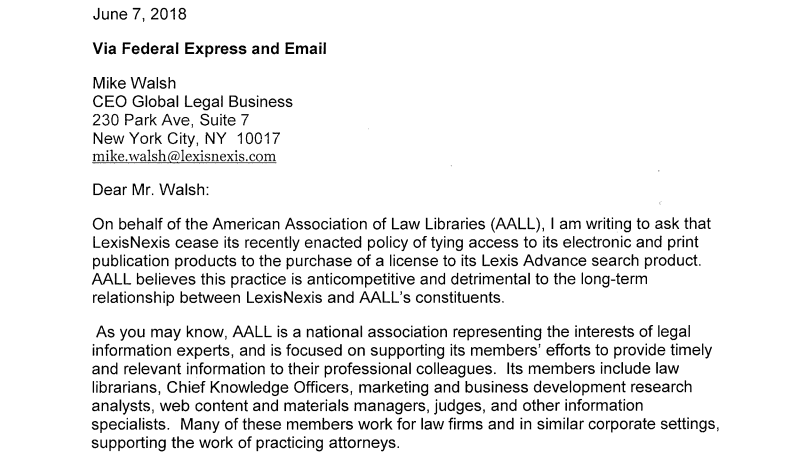A month from now, the American Association of Law Libraries will convene its annual conference in Baltimore. While Baltimore is typically hot in July, it might feel even hotter than normal in the vicinity of the LexisNexis exhibit-hall booth.
Last week, a lawyer for the AALL sent a letter to Mike Walsh, CEO of LexisNexis’s global legal business, accusing the company of anticompetitive sales practices and asking that it cease those practices and enter into a dialog with AALL leaders, “as opposed to legal or commercial action.”
AALL alleges that LexisNexis recently adopted a policy of requiring law firms to purchase subscriptions to the Lexis Advance research service as a condition of purchasing other electronic and print products.
In the letter, the AALL’s lawyer James P. Fieweger, a partner with Michael Best & Friedrich in Chicago, says that firms have historically been able to purchase from LexisNexis the publications and services that fit their needs. They could, for example, purchase specialized materials such as Moore’s Federal Practice, various treatises, or analytical tools such as Lex Machina, without having to license Lexis Advance.
Since July 2017, however, AALL has received numerous reports from law firm-affiliated members that LexisNexis has adopted a new sales policy. Under the new policy, firms are required to purchase a license to Advance before they can purchase access to other LexisNexis publications and products. And those firms that do not wish to purchase Advance, for whatever reason, have been foreclosed from accessing other products they have used in their practice for years and, in some cases, for decades.
The AALL’s Committee on Relations with Information Vendors attempted to discuss this with LexisNexis, the letter says, ‘but, to date, LexisNexis’ response has been vague, incomplete, and unsatisfactory, evincing. no interest or intent to revoke or otherwise modify the practice in question.”
I reached out to LexisNexis for comment on these allegations. A public relations representative told me, “LexisNexis is not commenting at this time.”
Jean P. O’Grady, senior director of information, research and knowledge services at DLA Piper and former chair of the Private Law Libraries Section of AALL, writes at her blog Dewey B Strategic that she has seen LexisNexis take “an increasingly combative stance” in contract negotiations with customers in recent years.
It is a rather sad commentary that Lexis appears to view their flagship legal research product Lexis Advance as a sinking ship which must be held afloat by their other product lines — mostly products which Lexis did not develop but acquired over the past few years. Are Lex Machina, Law 360, Ravel and Intelligize really commercial pontoons keeping Lexis Advance afloat?
The president of AALL, Greg Lambert, chief knowledge services officer at Jackson Walker, writes at his blog, 3 Geeks and a Law Blog, that this is an issue that should be of concern not only to knowledge professionals, but to law firm leaders as well.
This specific situation with Lexis should bother our administrative peers because of how much Lexis has a choke-hold on Legal news. They own Law360, and have industry contractual control of many of the big newspapers and legal news publications (American Lawyer Media). … What Lexis is doing is harmful to the industry and makes no logical sense other than they are trying to prop up a product that cannot stand on its own.
Jean O’Grady characterizes this situation as the law librarians’ “revolt.” In the face of that revolt, LexisNexis should open up about its policies. Neither it nor its customers are well served by its keeping its lips sealed.
 Robert Ambrogi Blog
Robert Ambrogi Blog